- Home
- Mark Wayne McGinnis
Guardian Ship Page 9
Guardian Ship Read online
Page 9
“Where should we sit?” Lori asked, looking around the craft’s interior.
“Go ahead and take the other chair,” I urged, gesturing to the one shoved beneath a console.
“No, I’m actually fine standing. Give the old lady the chair,” Lori said, looking pleased with her sarcastic comment.
I let it go.
Hannig said, “Please, direct me where to go, Dominic.”
“First get us out of this building, then head the ship back to Little Italy.”
Both women looked mesmerized as the craft dematerialized and silently descended down through the floor and into the apartment below, then down into the next apartment, and the next. Suddenly, we were moving forward through the building’s superstructure and outer walls.
“So, what’s the plan? You do have a plan, right?” Lori asked.
“My plan is to increase our present numbers with people I can trust.” I looked about the confined space and let out a breath. I’ll make it work, somehow.
“And who are they, these people you can trust?”
“People you may not approve of, but I know they’ll have my back,” I replied.
“Like hoodlums? Is that what you mean? Criminals?” Lori asked.
Georgina remained quiet, yet alert and attentive, clearly listening to every word.
“Gordo, Elmo, Carlo and Matteo,” I said.
“Sounds like an Italian barbershop quartet. Why them?” Lori asked.
“I told you, because I can trust them. And they’d have no problem pulling the trigger, if things get dicey.”
We were currently fifty feet aloft and crossing over the East River, and the island of Manhattan up ahead was shrouded in dark smoke. Lori’s radio crackled. In between bursts of static, a dispatcher was frantically relaying orders to command units on the Lower East Side. I knew that was her precinct, and I could see she was tempted to reach up to her shoulder mic and acknowledge the call. She remained stoic though—I think she was coming around to the idea that whatever minor help she could be of here in the city would pale in comparison to what we might, with luck, be able to do using Hannig’s ship.
I tried to call Gordo three times, finally getting through on the fourth try. Over FaceTime, I saw him shoving what remained of a cannoli into his gullet.
“Not a good time, Dommy,” Gordo said, sounding annoyed through his full mouth.
“Where you at?” I asked,
“I’m at home. Where do you think I’d be with the world coming to an end? We’re watching this shit on the tube.” He looked back at me quizzically. “Where you at?”
Ignoring his question for now, I caught sight of an arm and leg to the side of the screen; must be his girlfriend, Claire, sitting on the couch next to him. “I’m calling in a favor, Gordo. Actually, I’m calling in the favor,” I said. I once had saved Gordo’s life. I’d never mentioned it after the fact, never asked him for anything as a favor in return. But he and I both knew that someday there would be a reckoning. That’s just the way things worked in the neighborhood.
“Fuck! What is it you want?”
“Can you get ahold of Elmo, Carlo and Matteo?”
“Probably. But you’ll have to give me a damn good reason why I should first. Not so much for me to know, but for them.”
I knew that Gordo would ask me for a reason, and I’d been trying to come up with something that wouldn’t sound crazy. “You trust me, brother? I mean really trust me?”
“Sure, you know I do.”
“I’m going to show you something. But first, get your fat ass off the couch and go into the other room.”
“Seriously?”
“Just do it.” I heard Gordo mumble something to Claire. A few moments later, Gordo—now sounding even more annoyed—said, “I’m in the shitter . . . so what’s so secret I have to hide it from my woman?”
“Gordo, some weird stuff has gone down.”
“You mean like aliens heading to Earth?” he asked, smirking a half-smile.
“Funny you should bring that up.”
He stared back at me—not getting my inference.
“Gordo, the aliens, the ones coming here, they’re really bad. They have something really bad in mind for Earth.”
“Never would’ve guessed. But you know this how? You’ve got a special way to communicate with them? Maybe that Cracker Jacks decoder ring you got as a kid lets you listen in on their special communications in their big spaceship?”
I continued on, “I’m here with my boss, Georgina, and Tedesco’s daughter, Lori. She’s a cop—”
Gordo cut in, “Oh yeah, a little hotty, that one—”
I avoided Lori’s baleful stare. Thankfully she was offscreen. “Just listen to me! I’m on a spaceship, with an alien. One of the good ones.”
Gordo was already rolling his eyes. “Funny, haha, but this is not the time for jokes.”
I turned my iPhone around to show him Georgina first, and then Lori. Both waved at Gordo. I knelt down next to Hannig and pointed the phone’s camera at the two of us, like a video selfie. “This is Hannig. And yes, he is real. And no, this is not a gag.” I swung the phone around to show the interior of the spacecraft. “This is the alien spacecraft we are now traveling in.” To finish it off, I swung the phone out toward the wide, impossible windows of the craft and the burning city beyond. I flipped the phone back around so I could see Gordo’s face. His smile was gone. For once, he was speechless.
Chapter 18
Gordo directed us to head on over to a building off Barrow Street, on the Lower West Side. I’d been there before and, for as long as I could remember, the old Keller Hotel was both abandoned and a real shithole. We were to meet on the top floor of that six-story brick structure.
Lori and Georgina were mostly silent for the remainder of the trip over to lower Manhattan. Perhaps they were mentally reconsidering their decisions to get involved, or maybe trying to prepare for what unknown dangers still awaited us.
Hannig periodically spoke to his ship, or—more accurately—to the ship’s computer, which he typically referred to as “System.” He spoke in English. I’m not sure if that was for our benefit—perhaps, to make us feel more connected to what was going on—but whether intentional or not, I appreciated it.
The view screens relayed that things had only worsened on the streets of New York City. With more fires being set, entire city blocks were now ablaze. So far, fortunately, things still looked relatively quiet where we’d just left Anna and Val and Nonna.
“We are coming up on the specified location, Dominic,” Hannig said, glancing up at me.
I took in the old hotel now, just outside through the large portal window.
“Creepy,” Georgina said, as if reading my mind.
“Take us on in. Go up to the top floor,” I said. “And can keep us invisible when we get there? Still not sure just what we’re walking into here.”
“I thought you said you could trust these guys . . . that they ‘totally would have your back,’” Lori said, making her voice go deep, taking on a more pronounced Italian accent.
“I don’t sound anything like that.”
She shrugged. I chose to ignore it. I didn’t want to get pulled further into that conversation. Sure, I trusted these guys, but I wasn’t stupid, either. They were crooks, for the most part, after all.
“Oh god,” Georgina said, gesturing to an onscreen CNN Special Report. “Can you turn the volume up on that, Hannig?” she asked.
A salt-and-pepper-haired Air Force general, wearing a navy-blue uniform that was festooned on one side of the jacket with an array of ‘fruit salad’ ribbons, was speaking into a slew of major network cable-news microphones:
“. . . craft has settled into a high-orbit position above Earth. Thus far, all attempts to communicate with the vessel have gone unanswered. But we are optimistic, hopeful I would say, that a friendly dialogue exchange will take place soon.”
The general smiled—his gaze drifting outward, e
ncompassing an unseen audience. He pointed and nodded toward someone. “Yes, you there in the back.”
“General Wright, are we doing anything to protect ourselves? What measures have you taken in case these visitors’ intentions are, well, not so friendly?”
“I assure you, our combined military forces stand at the ready. The United States and her allies are in constant communication. Our military counterparts in China and Russia are also in constant contact with us. But it is imperative that we do not send the wrong signals to our intergalactic visitors, that we don’t make them believe we anticipate or even desire some kind of conflict.”
The general pointed at someone closer in.
“Yes, General, have we spotted any kind of weaponry on the alien ship?”
The general clearly did not like the question. “I’m not going to answer any questions that cross over into matters of national security.”
I butted in. “Hannig, can you show us what that alien ship looks like?”
“Oh yes, that is simple for me to do.” He tapped at his console, and within seconds a three-dimensional alien spacecraft could be seen hovering high above Europe. It was an ugly ship—puke brown in color. Long and bulbous in some areas, thin in others, the surface of the vessel was uneven, with all kinds of protracted, running tubes, what looked like vent ports, various junction boxes, and also cannon muzzles—turrets. I counted five such weapons, arrayed on one side of the ship. I assumed there was a similar array positioned on the other side. “I guess this is an alien warship, of sorts?”
“Referred to as a Wikk Inquester ship, the vessel is indeed a warship, although it maintains thousands of secure holding cells as well,” Hannig said.
“What will it do now? Try to make contact?” Lori asked.
Hannig turned to face her. “I am afraid not. It’ll scan the planet’s surface, seeking to spot the most desirable life forms.”
“For?” Lori asked.
“Ingesting, of course. The Wikk have voracious appetites. Sample sources of beings will be abducted; probably several hundred samples in all. Humanoids are among the most sought-after species in the galaxy. More ships—many more, far larger than this one, will return to Earth within weeks.”
Lori narrowed her eyes. “So what . . . this is like some diner’s proverbial pass by the restaurant’s lobster tank? See if the specimens look good enough to eat?”
Hannig seemed confused by the analogy.
“Will that spacecraft, what did you call it . . . um, the Inquester ship, fire its weapons?” I asked.
“If there is any attempt to approach the vessel, yes. Or, of course, if they are fired upon.”
“How long will they remain here? How long does it take to grab up a few hundred ‘samples’?” Georgina asked.
“Not long; they perhaps will stay in orbit here for a week.”
“Well, I think we should make their stay here as unpleasant as possible,” I said.
Lori nodded in assent. “Make it so they never, ever, want to come back,” she added.
Hannig, who had navigated our vessel into the Keller Hotel, was now ascending higher through the floors. Most of the inside walls of the hotel had been stripped and gutted—plundered, I assumed, for any existing copper wiring, which could be sold in bulk for a nice profit. Ragged and torn sections of insulation lay exposed on the floor, like pieces of a disemboweled corpse. Beer bottles and fast-food cartons were littered everywhere. A foul smell had permeated into the ship’s compartment, despite the Watcher Craft operating in its cloaked mode. Both Lori and Georgina wore disgusted grimaces.
“Oh boy, your friends really know how to pick a meeting venue,” Lori said.
We rose up through the ceiling of the fifth floor, where a handful of flashlight beams cut through the darkness—crisscrossing paths every once in a while. This floor, although far from a ritzy Four Seasons Hotel, was relatively clean and debris-free. Even the pungent, invasive smell was gone. But there were five flashlight beams instead of four. Who else was here?
The question was answered as a beam shone on the fifth man’s face. Crap! It was Tito Caputo. Certainly not John Gotti, but a badass local crew boss just the same. The same crew boss I’d blown off meeting the other night, the same one I was in hot water with due to my gambling debts. Was he here now to help us, or only here to get his pound of flesh? I knew for a fact that Caputo had killed no less than six men with his bare hands, though he’d of course taken steps to make proving that impossible. Right now, he was the last person I wanted to see here.
At forty-five, he was movie-star handsome—a silver-haired Antonio Banderas. He wore his hair slicked back, kept in place using ample amounts of some greasy product. Caputo was a big talker. What history I didn’t already know about the guy over the years, Gordo had filled in. Since the age of sixteen, Caputo had always had a harem of girls close to him. He had a love/hate relationship with them—loved to be around them, but hated whenever they asked him for anything, be it free time, affection, or gifts. He was also known for smacking his women around, although they seemed to rarely, if ever, complain about it. Maybe he could be generous, when the right mood struck.
From what I’d heard, none of these women could ever live up to the ideal standard of his mother, Maria Caputo. She too had those good looks—like a dark-haired Bridget Bardot from the pictures I’d seen. Story was, whenever Tito’s mother and father Ricky went out on the town, it made Ricky crazy when other men ogled her. Word was he put Maria in the hospital with a broken cheekbone on one occasion. Like father, like son, I guess.
Conditions for young Tito were pretty much always stressful at home. Things came to a head one day when, around the age of fifteen, he walked into his parent’s bedroom and caught his dad with another man. Both were naked on the bed and going at it like gangbusters. Tito, disgusted, ran to get his father’s pump-action Remington out of the hallway closet. He shot both men—first in the face, and then in the balls. His mother, Maria, took the rap for the gruesome double murder. Currently, she was serving two consecutive life sentences at Riker’s.
So Tito today lived with a lot of rage. Understandable, I suppose, but no less frightening. It was the kind of rage that simmered beneath the surface, always close to boiling over. He’d put that pent-up rage energy into his gang life, and he lived for two things: power and money. Well, maybe three things: power, money, and his incarcerated mother. I’d heard he visited Maria regularly, telling her stories to make her proud of him, conjuring up ways to make her laugh, to make her life easier. He either bribed or threatens prison guards to ensure that she could maintain the best incarcerated lifestyle possible, considering her penned-for-life circumstances.
I contemplated shooting him right then and there. Better to get the drop on him before I received a bullet in the back.
I turned to face Lori. “I need to borrow your gun.”
Chapter 19
“Absolutely not. No way I’m giving up my service weapon. Not for you, not for anyone.”
“I’m not going to use it. And I’ll give it right back. Promise.”
She continued to stare at me, looking astounded that I’d even ask for such a thing.
Georgina said, “God, just give it to him . . . it’s not like you haven’t broken any other police regulations today. The simple fact that you’re here—”
“Fine!” she said, shooting the older woman an annoyed glare. Lori unsnapped the holster and withdrew her weapon, handing it to me muzzle first.
“Everyone hold tight for a spell,” I said, heading astern. “Oh, and Hannig, can you open that rear hatchway?”
Earlier, Hannig had explained it to me. While the ship was in this invisible, veiled mode, people or things on the outside could pass into and even right through the vessel. Unless keenly aware of the situation, they would not even notice the ship’s presence, or its inhabitants. But those within, like Hannig and the rest of us, couldn’t simply leave by walking out through a bulkhead to go outside. I didn’t
understand the physics, but apparently it was some kind of built-in safeguard.
I stood at the rear of the ship and watched as the five members of the Elizabeth Street crew, now satisfied that they were alone within the building—or at least within this top floor—convened together in the largest of the rooms. Although, since all the walls were little more than open studs, it wasn’t much of a room. They formed a circle. Their flashlight beams pointed downward, creating a set of bright spots on the dingy wood floor. I spotted Tito Caputo again, and fortunately, his back was to me. The other four stood quietly while Caputo spoke. I couldn’t make out what he was saying—he was murmuring too low. Undoubtedly, he was giving the crew orders of some sort. Maybe how best to kill me. Would they follow his directives? No way. These guys were closer to me than if they’d been my own flesh and blood—they were more than brothers.
First, there was my best friend, Gordo. At twenty-six, he was freckle-faced with big teeth, and tall, like me—maybe six-foot-five and 220 pounds. Gordo had three brothers, Tommy, Sal, and Sammy. Sammy was shot by a rival gang member about a year ago, when he was just twenty-one, and was now paralyzed and in a wheelchair. He lived with his mom and dad in a walk-up apartment on Canal Street. Gordo went to see Sammy every day, rain or shine. Gordo made a promise to his mom and dad that his other brothers would stay out of Gordo’s “business,” no matter what.
Next came Elmo Fiscelli. Twenty-five and about five-eight, short and skinny. Not much of a fighter, but smart as a whip. He wore glasses that made his eyes look humungous and always seemed to be smudged, even right after he wiped them. His parents also lived on Canal Street, and growing up, he and the rest of us were good friends. We played a lot of stickball in the street. Later, Elmo got heavy into stealing cars. Had a knack for it, but one time, when he was around sixteen, he got pinched. He got three years in the Horizon Juvenile Center out in the Bronx. It was a stiff sentence, but the judge was making a statement about Elmo not giving up any of his accomplices’ names. In fact, Elmo preferred to steal cars on his own, but the judge hadn’t believed him—Elmo was just that talented. He ended up being a model inmate, got a cushy job in the office doing some kind of accounting. When he first started serving time at the center, he met other boys, several junior members of the Elizabeth crew—and boys from some other crews as well. This was his indoctrination of the life he would lead, once released. Criminals weren’t so much born, but molded by their accumulated, often hard-lived experiences.

 The Hidden Ship
The Hidden Ship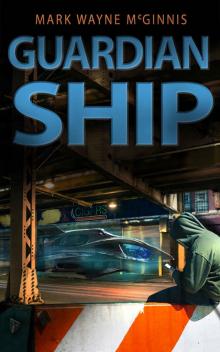 Guardian Ship
Guardian Ship Cloudwalkers
Cloudwalkers Mad Powers (Tapped In)
Mad Powers (Tapped In) Ship Wrecked
Ship Wrecked The Great Space (Scrapyard Ship Book 6)
The Great Space (Scrapyard Ship Book 6) Ricket (Star Watch Book 2)
Ricket (Star Watch Book 2)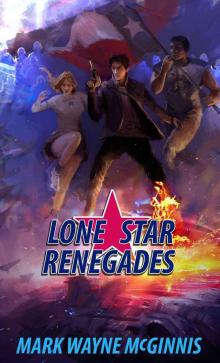 Lone Star Renegades
Lone Star Renegades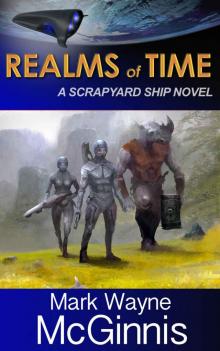 Realms of Time (Scrapyard Ship)
Realms of Time (Scrapyard Ship) Glory for Sea and Space (Star Watch Book 4)
Glory for Sea and Space (Star Watch Book 4) Scrapyard Ship 3 Space Vengeance
Scrapyard Ship 3 Space Vengeance Boy Gone
Boy Gone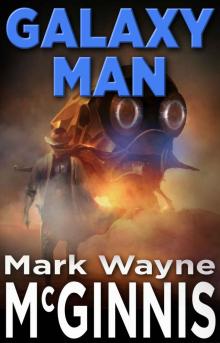 Galaxy Man
Galaxy Man Scrapyard Ship
Scrapyard Ship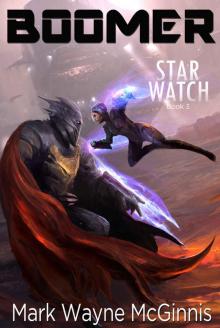 Boomer (Star Watch Book 3)
Boomer (Star Watch Book 3)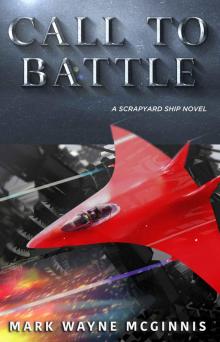 Scrapyard Ship 7: Call to Battle
Scrapyard Ship 7: Call to Battle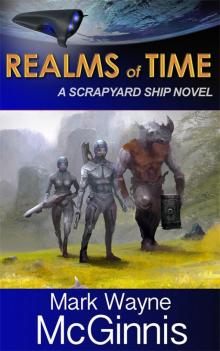 Scrapyard Ship 4 Realms of Time
Scrapyard Ship 4 Realms of Time Star Watch
Star Watch The Simpleton QUEST
The Simpleton QUEST The Simpleton: An Alien Encounter
The Simpleton: An Alien Encounter Scrapyard LEGACY (Star Watch Book 6)
Scrapyard LEGACY (Star Watch Book 6) Ship Wrecked: Stranded on an alien world
Ship Wrecked: Stranded on an alien world